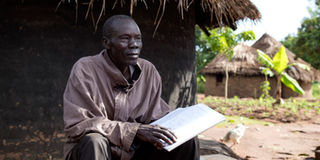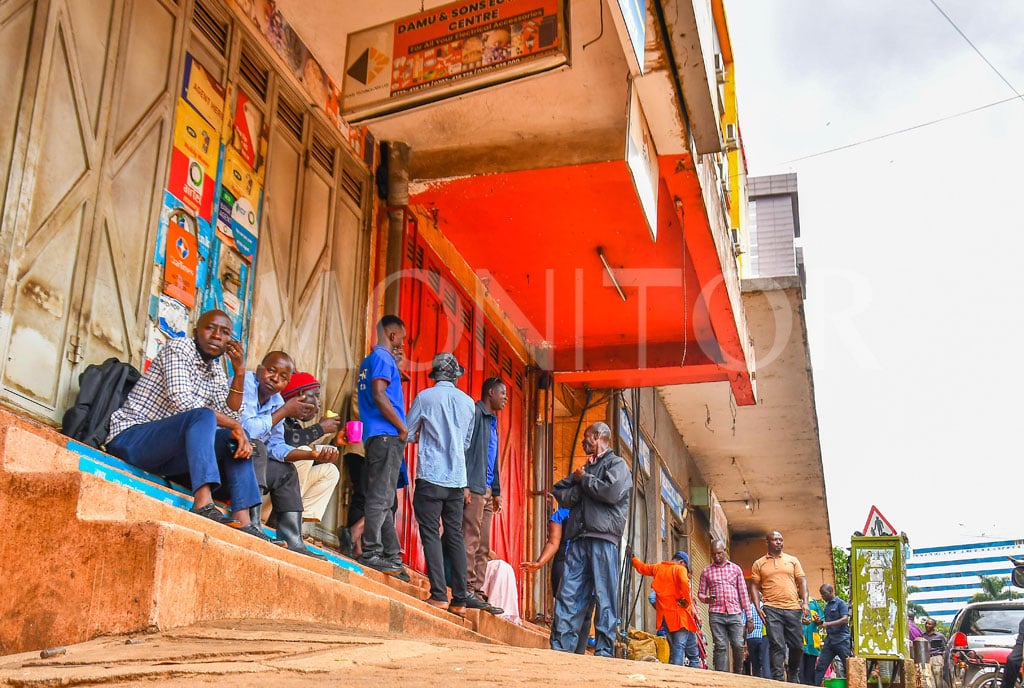Using home libraries to improve literacy

Killion Obatre not only loans books from his home library, but he has also created writing exercises and tests to help local children improve their skills. Photo by Linda Givetash
Every Saturday, children gather at Killion Obatre’s home, eagerly waiting for him to open the door to a wealth of stories.
Obatre operates a small community library at his home in Opevu village. Children from the nearby Ayelembe Primary School can select from over 100 titles to either read at the library or take home.
“Now that we started this thing, they are learning to read and write,” Obatre said of the children making use of his services.
Innovation
He’s not the only parent volunteering time to help children learn outside the classroom. More than 150 parents are running community libraries in Arua District.
“The initiative was proposed by the Aga Khan Foundation Uganda (AKFU) under their Reading for Children programme as a way of improving literacy and creating enthusiasm for education in the district,” said Sammy Abonyo, lead project officer for AKFU Arua District.
AKFU approached its partner schools in the area and developed a plan to work with both teachers and parents to create small libraries that would be accessible to children outside school hours.
AKFU trained teachers to oversee the community libraries and supplied the books and secure bookshelves to store the materials.
Individual schools then selected three parents, who were already active in the community, to house a library. Teachers in turn trained parents on how to keep record of all the books, track student attendance and encourage both students and other parents using the library.
Growth
Since the libraries opened in 2013, many communities are seeing success.
Maureen Avako is a Primary Four pupil at Ayelembe Primary School. Her class teacher, Keren Osoru, said her reading skills have improved with the extra practice of reading library books.
“She is active in the class and she is able to read on her own,” Osoru said of Avako.
Ms Osoru said she appreciates the supplementary education libraries are providing.
“It is a good idea to start home libraries because it’s the community which guides children in reading,” Osoru said.
While a parent oversees a library, it’s children who are borrowing the materials, not their parents on their behalf, according to Abonyo.
There are benefits to children choosing their own books, because they can choose books based on their interest and skill level. Children visiting the libraries together can also learn and motivate one another.
Benefits
In some cases where parents have poor literacy skills, or simply lack the time, children have taken up the task of reading or recounting a story from a book to their parents at home.
“That ability to re-tell the story is enough to show comprehension, improving on the child’s understanding of the concepts,” Abonyo said.
And the practice of sharing stories is also motivating parents to be more involved in their children’s education.
“Our priority isn’t about just reading, reading, reading. What are those other aspects of the learning that the child can get from the parent?” Ms Abonyo said.
Not all the community libraries have been an immediate success. Abonyo said records show very few books are borrowed at libraries where parents are not active.
It’s a challenge AKFU and the schools are trying to mitigate with more encouragement for the community.
The bigger picture
In some cases, communities have established reading competitions between villages to entice young readers and their parents.
The extra encouragement is not needed for Obatre. More than half his books have been signed out and children — boys and girls — visit weekly to read from the collection.
With three young daughters at home, seeing them and their peers embrace reading and writing is a source of pride for him.
“Education is my best subject I need to give to the pupils,” he said. “Because they know how to read and write, I think their future will be okay.”




